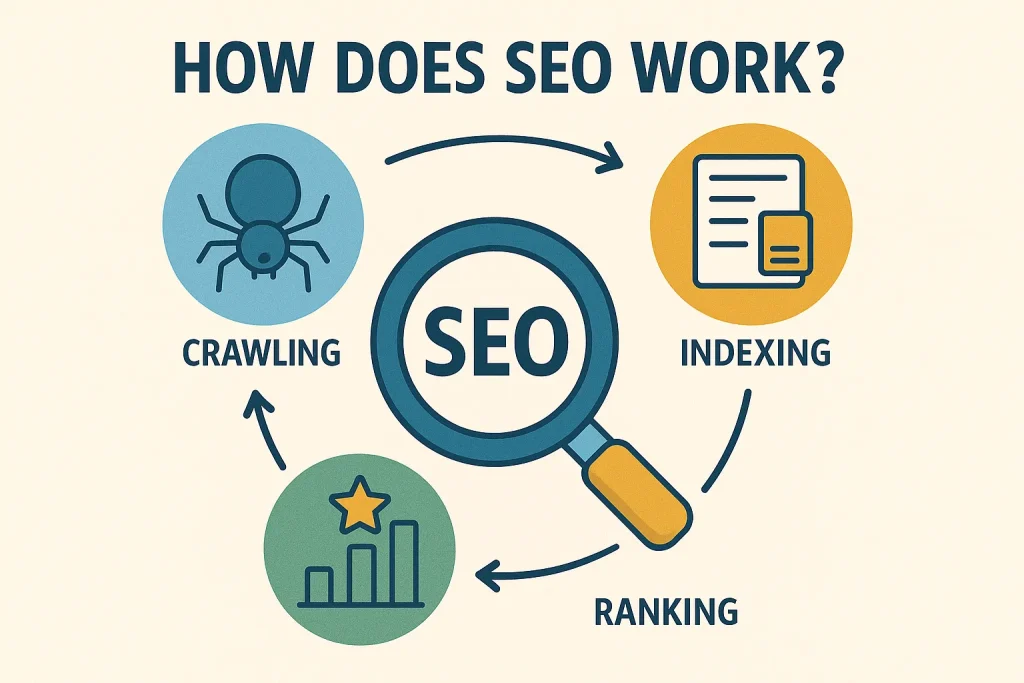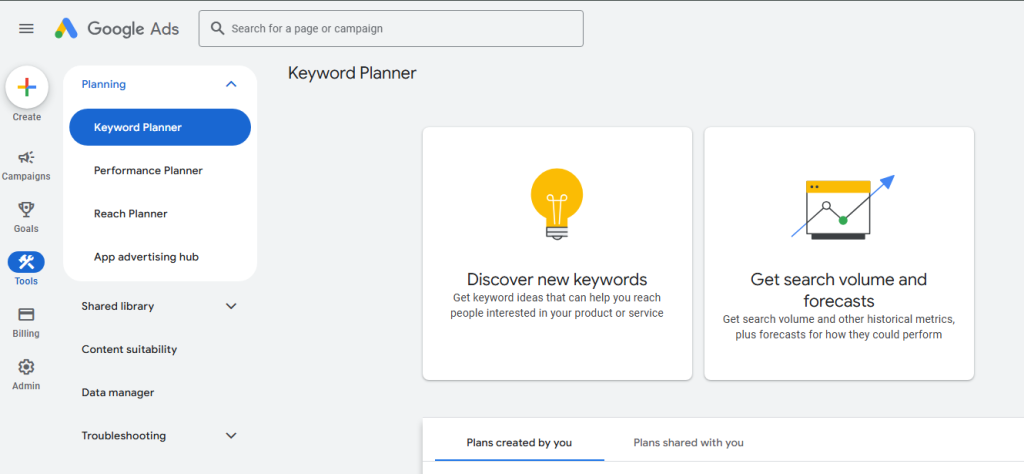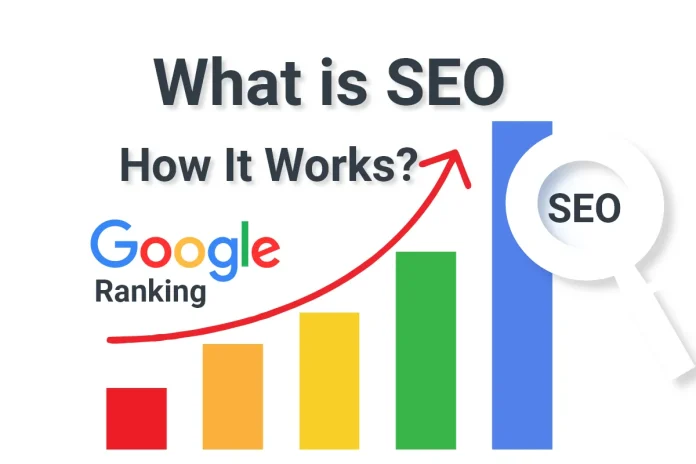What is SEO?
Ever wondered why some websites pop up first when you Google something, while others are buried on page five? That’s the magic of SEO.
SEO, or Search Engine Optimization, is the practice of optimizing your website so it ranks higher in search engine results, primarily Google. When done right, SEO brings more organic (non-paid) traffic to your website, which means more visibility, leads, and conversions—all without spending a dime on ads.
Whether you’re a blogger, a business owner, or just curious about digital marketing, understanding what is SEO and how it works is your first step to online success.
Why SEO is Important
Imagine you’ve opened a new shop in a hidden alley with no signboard. No one knows you exist. That’s your website without SEO.
Here’s why SEO is critical in 2025:
- Free, Long-Term Traffic – Unlike paid ads, SEO brings consistent visitors without daily ad spend.
- Builds Trust & Credibility – Top-ranking sites are seen as more trustworthy.
- Boosted Online Presence: Since the majority of internet journeys start with a search engine, optimizing your site can significantly improve discoverability.
- More traffic: Higher rankings mean more clicks.
- Cost-effective: Unlike ads, organic traffic doesn’t cost per click.
- Long-term results: Good SEO continues to pay off long after the work is done.
In short, SEO is your digital storefront signboard. Without it, you’re invisible.
SEO How it Works

SEO isn’t just stuffing your page with keywords. It’s a strategic process that aligns your content with what users are searching for, and how search engines evaluate relevance.
At its core, SEO relies on three pillars:
1. Crawling
Crawling is when search engine bots, or “spiders,” explore the web to find new or updated pages. They follow links from one page to another, like a treasure hunt. To make your site crawlable:
- Ensure your site has a clear structure with internal links.
- Use a sitemap to guide bots to important pages.
- Avoid broken links that confuse crawlers.
2. Indexing
Once crawled, pages are indexed—stored in a massive database. Think of it as a library catalog. Search engines analyze your content to understand what it’s about. To improve indexing:
- Use descriptive titles and meta descriptions.
- Include relevant keywords naturally.
- Fix technical issues like duplicate content.
Pro tip: Use tools like Google Search Console to monitor indexing issues.
3. Ranking
When a user searches something, the search engine pulls relevant pages from its index and ranks them based on over 200 factors. These include:
- Relevance: Does your content match the user’s search intent?
- Speed & Responsiveness: Site speed and mobile-friendliness
- Backlinks: Backlink from trusted websites
- User engagement (clicks, bounce rate, time on site)
- Relevance: Does your content match the user’s search intent?
- Credibility: Do established and trustworthy websites refer back to your content through backlinks?
- User Experience (UX): Is your website responsive, quick to load, and simple for users to navigate on both desktop and mobile devices?
For instance, a blog post optimized for “SEO marketing for beginners” with quality content and backlinks is more likely to rank higher than a poorly optimized page.
That’s the basic framework of how SEO works.
Types of SEO
To master SEO, you need to understand its three main types:
On-Page SEO
Focuses on optimizing content within your website.
READ ALSO:
- Content Strategy Example: How to Build a Winning Plan in 2025
- How to set up Google Ads account: Step-by-Step PPC Guide for Beginners 2025
Key elements:
- Title tags & meta descriptions
- Headings (H1-H3)
- Keywords in content
- Internal linking
- Image alt text
- Mobile responsiveness
Example: Writing a blog post titled “What is SEO and how it works” with structured headings and relevant keywords.
Off-Page SEO
Refers to external signals that influence your website’s authority and ranking.
Key strategies:
- Building backlinks from reputable websites
- Social media shares
- Guest blogging
- Influencer mentions
Example: Getting a backlink from an industry blog linking to your SEO guide.
Technical SEO
SEO also requires technical enhancements that help search engine crawlers better understand and index your site.
Areas to focus on:
- XML sitemaps
- Robots.txt file
- Page speed
- Mobile usability
- HTTPS (secure site)
- Fixing crawl errors
SEO Marketing for Beginners (2025 Edition)
If you’re just starting out, don’t get overwhelmed. SEO is a skill you can build step-by-step.
Here’s how to get started:
1. Learn the Basics
- What is SEO?
- How do search engines work?
- Why content matters
2. Choose a Focus Keyword

Use tools like:
- Google Keyword Planner
- Ubersuggest
- Google Trends
Example Keyword: “What is SEO and how it works”
3. Optimize One Page at a Time
- Add the keyword in the title, URL, H1, and first paragraph
- Use it naturally throughout the post (not stuffed)
- Include images with alt text
4. Create High-Quality Content
Google rewards content that:
- Solves a problem
- Is easy to read
- Offers value
5. Start Building Backlinks
- Reach out to bloggers in your niche
- Share content on forums, Quora, and Reddit
- Guest post on related sites
How to Start Doing SEO in 2025
Search engines evolve—so should your SEO strategy. Starting or Enhancing Your SEO Strategy in 2025:
✅ Focus on User Intent
Understand why users search a phrase and tailor content to solve their problem.
✅ Optimize for Voice & AI Search
More users are searching with Siri, Alexa, or Google Assistant. Use natural, conversational phrases.
Example: Instead of “SEO tips,” go with “How can I improve my site’s SEO?”
✅ Mobile-First Optimization
Over 70% of searches happen on mobile. Make sure your site loads fast and is fully responsive.
✅ Improve Page Experience
Begin by evaluating your website performance using tools like Google PageSpeed Insights and checking Core Web Vitals for loading speed, interactivity, and visual stability. A fast, intuitive site = higher rankings.
✅ Structured Data (Schema Markup)
Helps search engines understand your content better and enhances visibility with rich results (stars, FAQs, etc.).
Common Mistakes Beginners Make
Avoid these common rookie SEO errors:
- Keyword stuffing – Makes content hard to read and can hurt rankings.
- Overlooking Mobile Optimization – With Google using mobile-first indexing, having a mobile-optimized site is no longer optional.
- Neglecting backlinks – No authority = poor ranking.
- Writing for bots, not humans – Good SEO starts with good UX.
- Skipping meta descriptions – These affect click-through rate.
- Not updating content – SEO is not a one-time job.
FAQs: Understanding SEO and How It Functions in 2025
Your Top Questions About SEO, Answered
Wondering what is SEO and how it works? Whether you’re new to search engine optimization or want to boost your website’s rankings, these FAQs break down the essentials for SEO for beginners.
From understanding SEO basics to applying keyword research, we’ve got you covered with clear, actionable answers for 2025.
Q1. What is SEO?
Search Engine Optimization (SEO) refers to the techniques used to improve your website’s visibility and ranking in search engine results, particularly on platforms like Google.
By optimizing content, keywords, and technical elements, SEO helps your site appear in search results when users look for relevant topics. Understanding what is SEO and how it works starts with knowing it drives organic (free) traffic to your site.
Q2. How does SEO work?
To grasp what is SEO and how it works, think of search engines as librarians. Google crawls websites, indexes their content, and ranks pages based on relevance and quality for search queries.
How SEO works involves optimizing your site with keywords, quality content, and technical fixes to match user intent, making it easier for Google to recommend your pages.
3. Why is SEO important for my website?
SEO drives organic traffic to your website by making it more visible to users searching for relevant content.
Knowing what is SEO and how it works helps you attract users searching for your products or services.
For example, a bakery optimizing for “fresh cupcakes near me” can rank higher, driving local traffic. Studies show 75% of users don’t scroll past the first page of results, making SEO vital for SEO for beginners.
4. What are the main types of SEO?
Understanding what is SEO and how it works involves three main types:
On-Page SEO: Focuses on optimizing the content, headers, keyword placement, and meta descriptions within your website pages.
Off-Page SEO: Involves acquiring quality backlinks and building your site’s authority and trustworthiness online.
Technical SEO: Improving site speed, mobile-friendliness, and structure.
All three work together to boost rankings for search engine optimization.
5. When can you expect to see SEO improvements?
When learning what is SEO and how it works, patience is key. SEO typically takes 3-6 months to show significant results, depending on competition and your site’s starting point.
For SEO for beginners, consistent efforts in keyword research and content updates can speed up progress, but unlike paid ads, SEO is a long-term strategy.
6. What is keyword research, and why is it essential?
Keyword research is the foundation of SEO. It helps you understand what your target audience is searching for and allows you to create content that meets their needs.
7. How can beginners get started with SEO?
For SEO for beginners, start by understanding what is SEO and how it works. Then:
Research keywords relevant to your niche.
Optimize your page titles and meta descriptions.
Start by producing high-quality, relevant content that addresses the queries your audience is searching for.
Use tools like Yoast SEO to guide optimization.
Small steps lead to big results!
8. What’s the difference between SEO and paid ads?
Knowing what is SEO and how it works helps clarify its difference from paid ads.
SEO drives organic traffic through content and optimization, taking time but costing less long-term. Paid ads (e.g., Google Ads) offer instant visibility but stop when you stop paying.
Combining both maximizes reach for search engine optimization.
9. How does Google rank websites?
A big part of what is SEO and how it works is understanding Google’s ranking factors. Google uses algorithms to evaluate:
Relevance: How well your content matches search intent.
Quality: Engaging, well-structured content.
Authority: Backlinks and site trust.
Technical Factors: Site speed and mobile-friendliness.
SEO optimizes these to improve rankings.
10. Is it possible to handle SEO on your own, or is professional help necessary?
You can absolutely start SEO yourself by learning what is SEO and how it works! SEO for beginners involves simple steps like optimizing content and using free tools like Google Search Console.
For complex sites or competitive niches, an SEO expert can help, but beginners can achieve great results with consistent effort.
Conclusion: Ready to Start Your SEO Journey?
These FAQs simplify what is SEO and how it works, giving SEO for beginners a clear path to improve their website’s rankings. From keyword research to understanding Google’s algorithms, search engine optimization is about making your site user-friendly and relevant.
SEO can feel overwhelming at first, but once you understand what SEO is and how it works, it becomes a powerful tool to grow your brand, blog, or business online.
Whether you’re just starting or looking to refine your SEO skills, focus on creating value-packed content, optimizing your site structure, and building trust through backlinks.
👉 Want to learn more? Check out our SEO Tutorials and Case Studies to go beyond the basics and start ranking like a pro.
Download free: On-Page SEO Checklist for 2025
Have a question? Drop it in the comments or reach out—we’re here to help you succeed in SEO.
